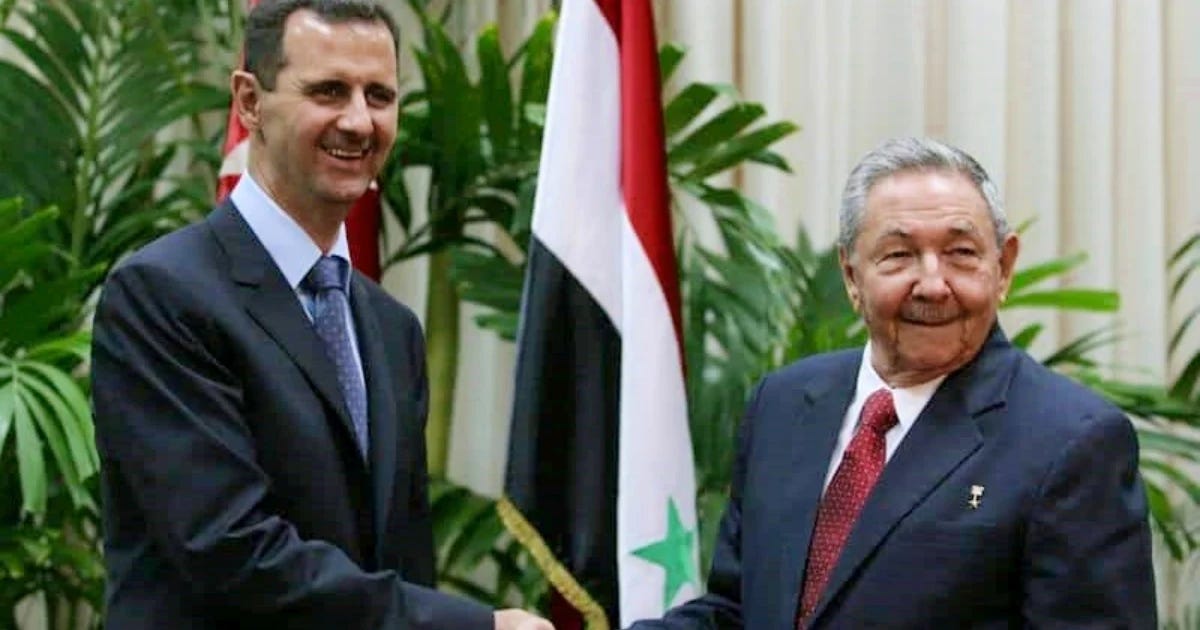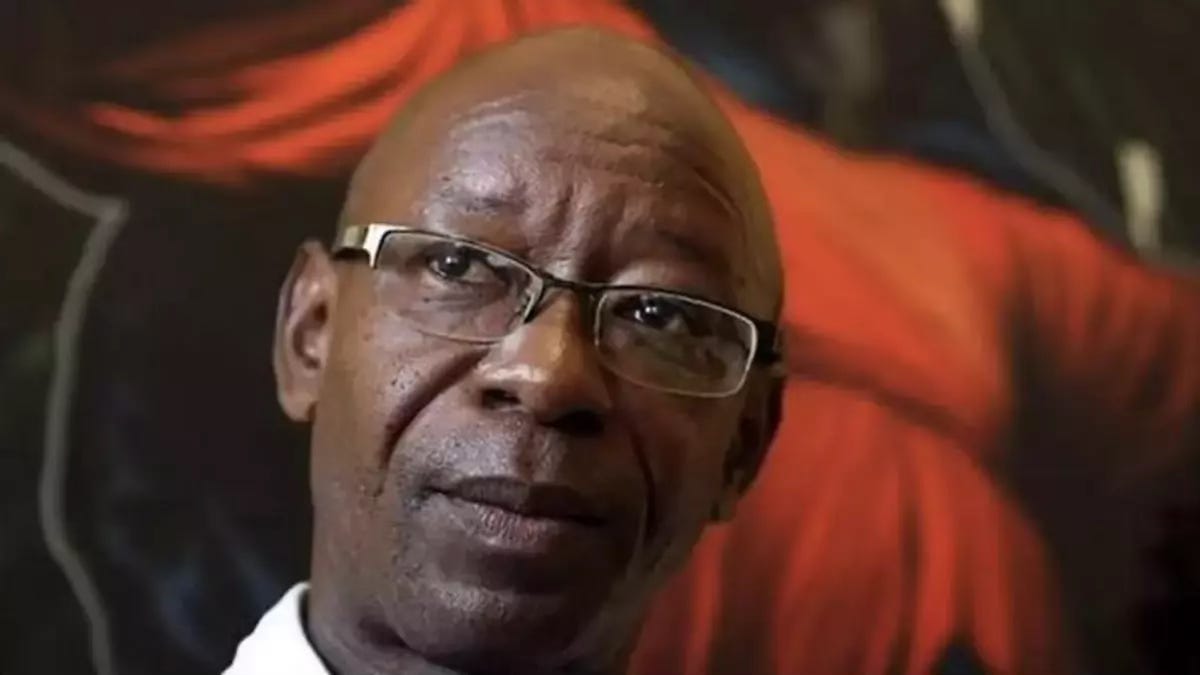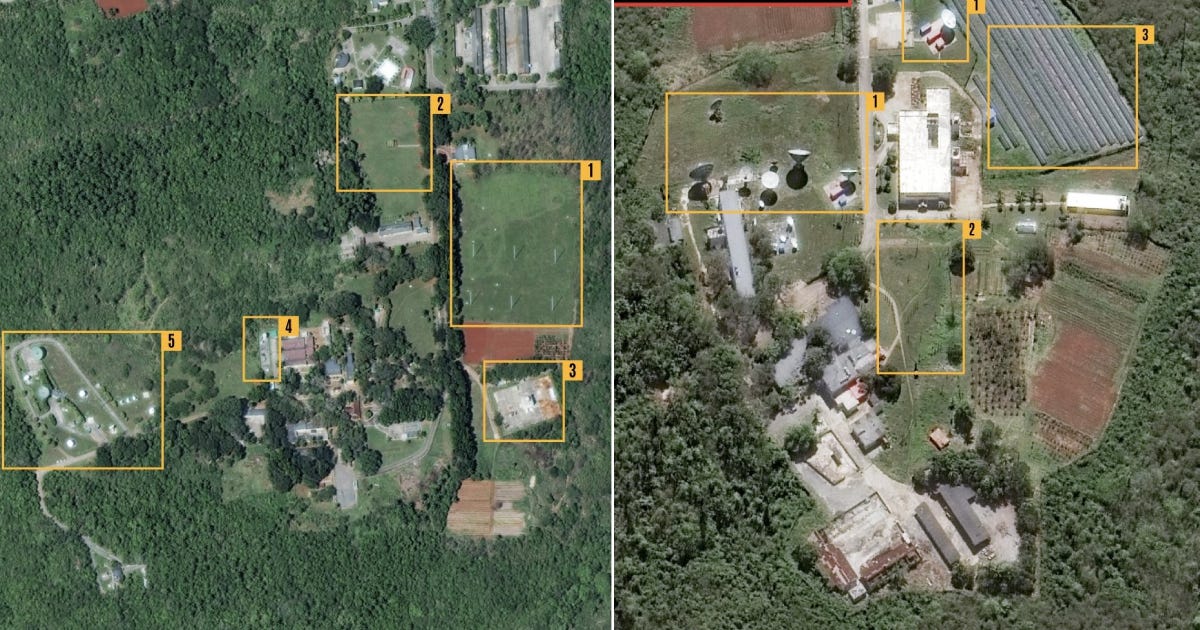Round up the Usual Suspects—it's International Human Rights Day
Cuba cracks down on opposition as world honors human rights/Regime revokes private sector access to wholesale market, reclaims monopoly/New evidence Cuban spy stations linked to China are ramping up.

Hola, welcome. And gracias for being here . . .
God, I miss Spanish.
While Papi was still alive, I could count on hearing my native tongue every day. If I wasn’t physically with him each night at 7pm, I was on the phone with him. The sound of his Cuban Spanish rippling from my cell phone brought me back to my Spanish-filled days, when our yellow duplex on Hunt St. in Nashua, New Hampshire, was full of relatives of all ages, dogs, canary song flowing up from Papi’s basement aviary, and the usual stray Americanitos hanging around, hoping Abuela would fry up some plantains before it was time to go home.
The Spanish desert I’ve been living in since Papi died made Yoani Sánchez’s Cafecito Informativo podcast even more meaningful to me. Not only was I getting a street-level view of the real Cuba from a fearless, accomplished journalist every day, I was listening to Cuban-accented Spanish daily. The tone of her voice, her phrasing, her word choices, reminded me of other fearless Cuban women I’ve known. My mother and my aunt, who led us out of Cuba and into our new Cuban American lives in New Hampshire, in 1967.
But that Spanish oasis is about to end, too. Yon announced this week that Cafecito will end this month after a six-year run. Too many connectivity problems, power outages, censorship. She’ll keep reporting, but in writing and through 14ymedio.com.
I’ll have to hunt for another daily dose of Cuban Spanish to keep that motor running. I can’t let it get cold, or forget the voices of Cubanness, the voices of home.
For your dose of Cuba news, here are this week’s three scoops.
Uno. Cuban activists and independent journalists reported heightened surveillance, detentions, harassment, and cuts to telephone service in recent days—the regime’s annual attempt to silence the opposition on International Human Rights Day, 10 December.
Dos. Regime revokes private sector access to wholesale market, reclaims its monopoly.
Tres. New evidence links China to ramped-up spy bases in Cuba. Note that embargo and energy grid obstacles don’t seem to have stifled these initiatives.
Thanks so much for reading and caring.
Hasta la semana que viene,
Ana

Uno
The high cost of basic human rights in Cuba
Cuban activists and opposition members have learned to expect trouble as International Human Rights Day approaches. This December 10th was no different.
Numerous activists and independent journalists reported cuts to their phone service early this week. By late Tuesday, police operations and arrests were also reported at the homes of dissidents and reporters.
The operations began last weekend with several arrests of dissidents, including activist Agustín López Canino, who was arrested last Sunday, for the second time in less than a week, to prevent him from attending a gathering he attempts to organize on International Human Rights Day on the Malecón, in Havana.
And last week, internationally known Cuban dissident Manuel Cuesta Morúa was arbitrarily arrested near his home. He’d alerted close friends that he’d seen state security forces in front of his home. NGOs raised the alarm about the arrest and several speculated it was connected to the upcoming international commemoration of human rights.
Cuesta Morúa’s unusual approach to opposition—he uses the regime’s own legal and official channels to launch complaints—has been an ongoing embarrassment for the government, as it reveals the government’s false claims of equal justice for all.

Morúa recently presented a habeous corpus petition in a Cuban court for the immediate release of dissident José Daniel Ferrer, who’d been brutally beaten in prison.
This Tuesday, Prisoners Defenders made public an audio of Ferrer in which he describes his health on the sixth day of his new hunger strike: "The acidity is already a problem my gums are bleeding, my throat and kidneys are also presenting problems".
In the message, which the dissident’s wife recorded during a rare call home, the leader of the Patriotic Union of Cuba (UNPACU) said some of the wounds from the beating he received on November 18 had not healed. "We don't know if they inoculated you with something through those wounds," his wife says in the recording, to which Ferrer replies that he does not doubt it.
Before ending the call, Ferrer said: "I don't feel well, but I am going to resist.” He expressed solidarity with all political prisoners and his condolences to the family of political prisoner and former UNPACU member Manuel Jesús Guillén Esplugas, who died in prison last week in what various organizations consider a murder.
Another UNPACU member passed away this week. Maykel Herrera Bones had been imprisoned many times for his non-violent pro-democracy activism. He was HIV positive, and he suffered setbacks after each imprisonment. His friends and relatives consider the relentless repression by the regime the cause of his failed health.
Also this week, at least three political prisoners announced hunger strikes, including an independent reporter who was jailed last month for protesting a 45-hour power outage in his town.
The regime has tried to appropriate 10 December each year, organizing activities to distract attention from its abuses. This year, it organized activities with children and adolescents in various parts of Havana. Dozens of high school students were transferred to the Havana neighborhood of El Vedado to attend an event with clowns, recorded music and projection of audiovisual materials.
The regime’s recent promotion of #CubanosConDerechos (#CubansWithRights) hasn’t had the same slew of propagandistic comments as in other years. The exodus and connectivity problems related to the relentless power outages seem to have significantly reduced the pro-government digital troops, popularly known on the island as clarias.
Dos
Regime revokes private sector access to wholesale market, reclaims monopoly
An official announcement in the Official Gazette of the Republic delivered what will be the final blow to many of the permitted private businesses and sole proprietorships in Cuba.
The measure, effective immediately on 5 December, canceled the licenses for wholesale activities that had been issued to micro, small and medium private businesses, as well as to self-employed Cubans. Only those selected enterprises whose primary product is intended exclusively for the wholesale market will retain their licenses, but the transactions can only be done through a “state-controlled socialist enterprise.”
The revocation is part of a package of restrictions that have been rolling back the small gains made in the limited and highly regulated private sector. The official reason for the measure is “to regulate distortions’ in the economy resulting from the private sector’s “profit driven motives.” The new rules are also meant to “foster work alliances between state and non-state economic actors.”
From WhatsApp to Facebook, private businesses have been announcing liquidation sales as they unload all inventory and prepare to close. “We’re even selling the mirrors in the store,” said one woman.
The regime had already revoked the import licenses of one third of private businesses that had been authorized to import (24 of the 73 companies with that authorization).
Cubans on the street don’t need economists to tell them how this will impact them. They know more government controls mean more scarcity, as the private businesses that had at least managed to have some inventory will now close, leaving inefficient, corrupt, state-run vendors as the only choice for consumers.
For Cubans rushing around searching for food for the traditional end-of-year celebration they hope to cobble together, the new measure must feel almost criminal. They’d come to depend on the private businesses for cooking oil, eggs, frozen chicken from the US, yes at sky-high prices, but at least they had the products. “Now where am I going to find these things,” one woman told 14ymedio. “I’ll have to go farther and farther from home, looking.”
Pedro Montreal, an economist in Spain who studies Cuba summed up the latest restrictions succinctly: “It’s economic suicide.”
Thanks so much for reading! Please share with friends and invite them to subscribe!

Tres
Trouble on regime’s horizon . . .
Trump’s state department won’t be warm and fuzzy . . .Think tank investigation shows Chinese spy bases ramping up in Cuba . . . US congressional report says “enemy agent” likely behind Havana Syndrome sonic attacks . . . Russia-backed Syria’s fall is Cuban regime’s nightmare.
I know. These scoops developed outside of Cuba’s opposition news scene. But I believe they have global importance and they don’t seem to be showing up in our headlines. So here you go.
A US think tank (CSIS) revealed in a report this week that four active signal intelligence gathering facilities in Cuba have a strong likelihood of supporting Chinese intelligence operations.
Cuba has deep ties with China and a history of purchasing its state-of-the art surveillance technology. Chinese technicians, diplomats, and business people have been active in Cuba for decades, ever since China stepped in after the USSR fell in the early ‘90s. Deals between the two countries on an array of “initiatives” began in earnest in 1999.
One of the signal gathering bases is near the site of a port expansion being financed by China. That site, in southeastern Cuba, has an antenna array capable of detecting signals, including phone calls, email, and non-communications signals like radar, from up to 9000 miles away.
CSIS warns that the bases are capable of collecting rocket launch data from nearby Cape Canaveral as well as US satellite trajectory and telemetry data, valuable information for China’s space program. Three of the sites are within 100 miles of Key West. At least one of the sites has a minimum of five entrances to subterranean installations constructed between 2010 and 2019.
While some of the sites have existed for decades, all have been recently updated and their security and technical infrastructure significantly upgraded. The report notes the “robust” operational support at two of the bases, including solar farms, which, given Cuba’s energy crisis, are valuable assets to dedicate to any operation.
The Chinese officials ridiculed the findings, saying they are based on “fantasy” and that they will not accept such “deliberate vilification by a third party.”
Tron (Latino pronunciation of “Trump”) just nominated Christopher Landau, US Ambassador to Mexico during his first administration, as deputy Secretary of State. Along with Tron nominee for secretary of state, Marco Rubio, the president elect seems to be doubling down on a border policy focus and, perhaps, US-Latin America foreign policy in general.
Landau would be uniquely poised to deal with the Mexican government on immigration and the tariffs Tron is threatening on Mexican imports if Mexico doesn’t do more to control border-bound migrant traffic through its territory.
Landau’s nomination has to trouble the dictatorships in Havana, Caracas, and Nicaragua. Rubio is a staunch anti-Castro (and Chavez and Ortega) voice within the US government. A tighter border and stricter Mexican enforcement of migrants would shut off the escape valve that Cuba, Venezuela, and Nicaragua have used during times of internal unrest and economic crises. And all three governments have profited from their citizens’ travel and visa expenditures, which are funneled directly into government coffers in many instances.
The fall of Russian-backed Bashar Assad can only be adding to the dictators’ woes. All three countries have diplomatic, military, and economic alliances with Assad and Russia. Cuba’s support of Assad’s stretches back decades and includes sending tank brigades to help his father during the Yom Kippur War, protecting Assad from UN accusations of crimes against humanity and war crimes, and supporting Assad’s government throughout its battle against opposition groups.
After an initial silence, Cuban officials tweeted about “great concern” about the overthrow and urged “respect of Syria’s sovereignty.”
Commenters had a field day. “You’re next,” warned one. Others derided the regime’s hipocracy for demanding respect of Syria’s sovereignty but supporting Russia’s invasion of a sovereign Ukraine. “What about Ukraine’s territorial integrity and independence? Did you ever call for respecting them?”
Russia snuck into Cuba-related news through another channel this week, when a US congressional investigation found that, contrary to the CIA’s earlier findings, sonic attacks on US and Canadian diplomats in Cuba are likely the work of a foreign adversary. The report also tied Russian sonic attack technology and at least one individual to what and were likely the work of an “foreign adversary.” The investigation confirmed findings by a five-year journalistic investigation of what has become known as “Havana Syndrome.”
Cuban Treat of the Week
Try to sit still to this little number from Cuban group Gente de Zona’s “Mama me lo contó.” Not traditional Cuban music at all, but it has a very old expression in the lyrics: Estas acabando con la quinta y con los mangos.
Very tough to translate, but it’s what you would say when someone has demolished something and there’s nothing left. The literal translation is “You’re demolishing the farm and the mangos.” I know. I know. I wish I could explain it better. Anybody up for this one?





